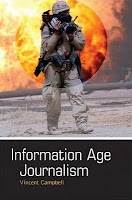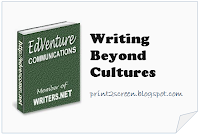Saturday, April 30, 2005
Writing Beyond Cultures
As a writer, I frequently have to customize my writings to fit the preference of my readers and their modes of reading. Juggling the two English language is no easy task. Where I live, people use International or British English. Where I study via distance education, I use International English too. Where I work, however, I use American English and when I write articles on-line at web sites such as faithwriters.com, I use American English too. The type of English I use depends on my target audience.
When I want to emphasise something in an article, I often write to emphasize the word, and while I write on the subject of favouritism at faithwriters.com, I have to clearly write favoritism, not favouritism. In the web where readers and writers of different cultures meet, there are readers who sometimes comment and correct writers in the way they write. In a case I know, I saw a reader cautioning the writer to be careful to write 'favoritism' without a 'u', although in truth there is nothing wrong with it, because the writer is writing from another part of the world that uses International English.
A thing to learn about international writing is therefore about our readers and about gatekeeping by the editors. The style we write in one country may be unsuitable for another, and even though the language used is all-English, the way we write is crucial if we want to pen our writings for international read. To be an international writer, we have to learn the ropes of international practices and customs. We must learn the style to adapt, so that our audience will read what we write. It is important to know that not all things about writing are about the language. Writers must be able to adapt to styles and variants in language to target an international reach.
Friday, April 29, 2005
International Journalism - A Book Review
 International journalism involves many facets of news reporting and includes areas like press freedom, news sources, objectivity, culture, and audience trends. Vincent Campbell (2004) in his book, Information Age Journalism, wrote on this subject. This blog entry provides an overview and critical review of the book.
International journalism involves many facets of news reporting and includes areas like press freedom, news sources, objectivity, culture, and audience trends. Vincent Campbell (2004) in his book, Information Age Journalism, wrote on this subject. This blog entry provides an overview and critical review of the book.The first chapter introduces the historical background of how journalism began and how it became what it is today. Current crises involved in international journalism mentioned by Campbell (2004) include technological development, emergence of commercial newspaper and broadcast industry, digital convergence, declining audience and diversity, tablodisation, and threats faced by journalists in non-democratic and developing nations (pp.3-27).
The second chapter looks into four theories of the press and explains why the belief of press freedom without state intervention is a myth, as there will always be some form of control, regardless of political or economic reasons.
The third chapter illustrates this point by showing how free market journalism and the role of journalists as watchdog in maintaining democracy in the Fourth Estate also face problems, such as audience preference for entertainment to serious news, reliance of news organisations on advertising revenue, influences of owner on editorial, and professional competition (pp.54-78).
The fourth chapter discusses the reliance of reporters on their sources for news (pp.80-83), and explains the importance of relationship between journalists and their sources. This relationship, however, can result in journalists' sympathetic tendencies to the cause and endanger the balance of neutral viewpoint in news (p.86).
News selection and gatekeeping are discussed in the fifth chapter to explain why audience's interest precedes the importance of news (pp.117-123).
The sixth chapter discusses the ethical issues of gathering and producing news, and the limitations of professional codes (pp.127-152). Issues discussed include human rights and privacy, taste and decency, confidentiality of information, bribery to write preferentially, news fabrication, unqualified account of events, erroneous foreign feed, adding of unknown facts, distorted presentation of information, and defamatory libel.
Threats to objectivity of journalism are covered in the seventh chapter (pp.153-154). These threats include the emergence of free market and commercialisation (p.156), exclusion and inclusion of ideologies (pp.166-167), reliance on official sources for news, and the dangers surrounding journalists' opinions and actual 'facts' (pp.173-175).
The eighth and ninth chapter looks into alternative news sources such as participatory and literary journalism, conglomerate influences, entertainment, sport, and lifestyle news.
The tenth and final chapter concludes the book by looking into the globalisation of journalism in the information age, wherein, Campbell says, "newspapers never really developed into international titles" because of the difficulty in producing and distributing news in synchronised content across countries, language barrier, and literary rates in certain countries (p.230). The rise and fall of foreign correspondents (pp.230-231) and new technology used in news gathering are briefly mentioned before the book concludes with considerations of the extent gatekeeping can be exercised in the new information age (pp.254-255).
As can be seen from the overview above, Campbell covered a large part of his book on topics pertaining to issues encountered by journalists in general news reporting situations, rather than in international context. The first two chapters provided a relative good start into the understanding journalism in a global scale, of the present day crises in journalism and the foremost important four theories of the press, with provides essential reading introducing international journalism. The topic on globalisation provides a good focus on journalism in international context, but it is only covered in the last chapter of the book, which leaves the rest of the chapters focused on general journalism topics. A first read of the entire book gives the reader the impression that the author may have realised nearer the end of the book that he has not met his intented goal and attempts to cramp everything on journalism in international context within a single chapter at the end.
REFERENCE
Campbell, V. (2004) Information Age Journalism. London: Arnold.
Wednesday, April 20, 2005
Between Learning and Writing
I am back to full time work at the technology desk, but this time with a difference. I may be working for a technology company, but I am no longer an analyst or a consultant, but as a writer, a technical writer, that is.
Writing has been my joy, and over the past years, I have struggled as a freelance journalist and writer for magazines, primarily in information and communications technology writings, but not limited to such subjects. Before I became a writer and journalist, I was in the technology line for about ten years in many areas, from technical support to professional services to project management and so on. I had enough of that and I believe I have enough of catching up with technology each day, with knowledge obsoleting every other day. It was a struggle.
Just yesterday, I handed in a study assignment which was due two weeks ago. Although I have been granted extension for the submission, it is the first time I have to beg for extension twice, just to get enough time. Overcome by fatigue working through the nights and the early mornings, my weekends are either momentary breathers or completely burnt. After handing in my first study assignment, I looked at my calendar to find the next, only to realise in shock I am already late with a day to go for another subject's assignment! I guess, once again, I have to play the begging game, and this is just for two study units this term, with three waiting the next semester.
That's my life in a nutshell, at least for now, struggling each day to balance work, study, and spiritual health. The only consolation is that I have only one and a half year to go to complete my studies, barring any unforeseen.
Saturday, April 02, 2005
Memories
Memories are things we cannot hide
The things we sometimes hope to forget
Yet there are things we hope we'll always remember
Or our achievements and our past will be gone forever
For if our identity is erased without a trace
It will be hard to live by the mercies of God's grace
Without memories
We will not know
What we have lost
Or what we have gained
To appreciate the things in life
That keeps us alive
To know what is worth
And what is not worth keeping
To give more than receive
To do good things
To live and appreciate
The things we have
The nature and the air
The beauty of God's creation everywhere
The water we drink
The air we breathe
The things we take for granted
And assumed always there
O God bless our memories
To remember the good
To learn from the bad
To move on to live our lives
To the fullest we know how
In ways guided by Your Spirit
In faith and love
In fruitfulness and charity
To do the right things
To bring good memories

